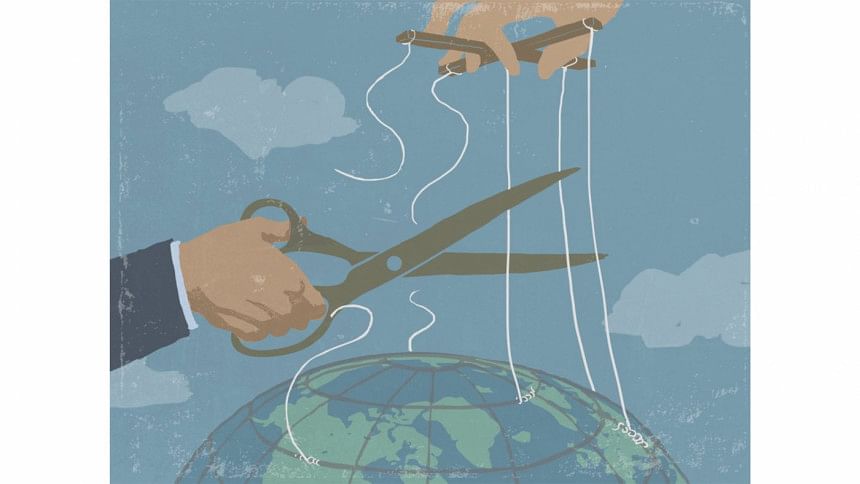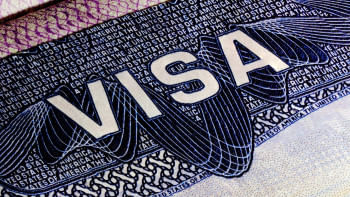US imperialism in the wake of Covid-19

Vladimir Lenin once said, "there are decades where nothing happens; and there are weeks where decades happen". Can anything be more relevant to explain the present?
Things fall apart. Time passes. And so will this pandemic. But what it leaves behind in its wake is a matter of worry. If history offers any lesson, pestilence like the plague, smallpox, cholera or the more recent Spanish flu caused severe socioeconomic hardship in different regions of the world. In turn they triggered political upheavals, power realignment and wars.
With over 350,000 dead, almost six million infected, and the world economy at a standstill, there is no reason to expect today's world to remain unaffected. What exact damage it may cause is a wild guess but one thing is certain: uncertainty. In view of earlier lessons, it's worthwhile to explore what the future holds; not to wade into fantasies but to prepare for the worst-case scenario. First, let's examine the broad parameters that define the present globalised world.
For the first time in history, the entire world is under a global empire, governed by the ancient doctrine: might is right. The facade of democracy, human rights, and rule of law are there but they do not impede the forcible imposition of the imperial will on weaker states. The imperial centre along with its allies, more accurately client states, operates on the premise that providence entrusted them the right to maintain world order; others must obey. Any defiance provokes reprisal. Imperial writ must prevail. It's imperial logic because it's the nature of power. Diplomatic pressure, sanctions, regime change, fermenting insurgencies, and when all else fails, military invasions are the handy tools to enforce order.
Yes, there is internal resistance from the more humane elements; yes, the allies/client states do grumble a lot; and yes, other power centres compete to make life difficult, but in the end the imperial centre holds sway. Its power stems from military might and financial control. And its driving force is imperial logic pressed by the insatiable greed to control the world's resources.
With nearly 800 military bases in 70 countries of varying sizes, the military control is obvious. What is trickier is the financial control. In the post Second World War period, the US dollar replaced the British pound sterling as the world's reserve currency. The war left USA relatively unscathed and the biggest creditor; its economy vast and sturdy to back it up. The dollar was as good as gold. This vast wealth creation was largely due to the munitions production of the Second World War, followed by the Cold War. After the war, manufacturing diversified into all kinds of items. Its economy became the global supplier and buyer of various goods and services from the rest of the world. A broad industrial base within a market economy created conditions for American multinational corporations to provide full employment and a feeling of exceptionalism, which in turn enabled its ruling elite to grow an imperial instinct. It's an affliction suffered by all powerful nations throughout history.
With the excuse of containing communism, this drive created a broad socioeconomic structure in the US that came to be known as the military-industrial complex. It grew exponentially ever since. What no one noticed, except a few perceptive academics, was that the so-called American dream got fundamentally embroiled in a permanent war industry. The complex is a collective of defence, energy, banking, tech giants and media industries that control every nook and corner of the American economy and politics. It meant and still means that continuing wars are an economic necessity. All other policies, foreign or domestic, are subject to this need.
But in the last three or four decades, besides the defence industries, most profits have come from manipulating finance, speculation and outright fraud; not from manufacturing sectors (the Smithian model). Profits without production became the new mantra of the ultra-rich. While one percent of Americans amassed incredible wealth, millions of workers lost jobs to cheaper workers in foreign lands. Globalisation accelerated this process. After the collapse of the Soviet Union, the imperial drive went berserk using whatever convenient excuse at the given moment. It's apt to note that three decades since, USA has invaded and/or destroyed nearly a dozen countries.
While the elites focus on their empire, nearly a third of America lives pay-check to pay-check. But the endless wars go on because it's the most lucrative racket. Permanent war comes at a huge cost, both human and economic. So long as most of the labour intensive industries were on US soil, the middle-class taxpayers paid the bill and the working class boys were sent to war. Once the assembly lines shifted abroad, America started running on deficit. Still the war racket didn't stop, costing trillions while the middle class dwindled and the number of working class falling under the poverty line increased.
How was the deficit met? As the world's reserve currency, most countries kept their foreign exchange in dollars with the US Federal Reserve System (Fed). Even after the Fed de-linked the dollar from gold in 1971, trust in the world's banker didn't suffer. So the Fed covered its deficit budget by borrowing from other countries' savings, hoping the American economy and foreign earnings would slowly reimburse the creditors. But as the war racket ratcheted up, so did borrowing. The debt pit got deeper. Then the Fed started issuing treasury bonds. Countries with surplus funds started buying these bonds to beef up their foreign reserves. America's swelling debt over the past three decades to 194 countries, by the end of the year, will accrue to more than 25 trillion US dollars, three of which is owed to China. None of this includes all the alarming private debts either.
The bankers and the clients are stuck in a gridlock. It's complicated. It means that every US dollar transacted pays a fee, whatever little, to the Fed. Second, all transactions are under the Fed's watch. It means transactions not to the liking of the US can be withheld or worse, confiscated, meaning any client i.e. any country unwilling to toe Washington's line runs the risk of losing its money. Only last year, the US and UK seized Venezuela's dollar and gold reserves. Third, the banker pays paltry interest but clients can't easily withdraw large deposits due to the fear of being sanctioned, although they too need dollar reserves to meet their balance of payments. All this provides the US enormous control over global finance. Despite so much control, America's fiscal balance still falters because the imperial instinct is insatiable.
While the defence budget rises, infrastructure keeps breaking down. Nearly a third of America can't afford healthcare and worse—they go hungry regularly, can't pay rent and are trapped in student debt. The US prepared for a global war, not a pandemic. The world watched baffled, the emperor naked behind the façade of invincibility. A mighty presence across the world is all bluster; unable to fend for itself. China did fumble initially but its stringent containment measures from mid January was there for everyone to see. The US and Europe imagined they were somehow immune; they wasted precious time but now blame China. There should be an independent scientific inquiry led by the WHO to find the origin and the nature of the disease so that this doesn't happen again. But if the US and its clients are bent on a witch hunt, there should also be a UN commission to assess the damages done by the colonial project, especially by the US, in the last hundred years or more.
John Perkins, author of Confessions of an Economic Hitman, commented "The Covid-19 death toll is just one of many examples of how the same people who bend weaker governments to their wills with conditional loans, corrupt deals and occasionally orchestrated coups hurt the American public." Can the US extricate itself from the debt trap? Not if it doesn't mend its ways and quickly. As the saying goes—"all debts catch up".
But that is anathema to imperial logic. In such conditions, power seeks quick fixes, which often leads to desperate measures. America's ruling one percent may threaten to seize China's financial assets if it doesn't fall in line, which may well lead to confrontation. They may look to start the Second Cold War with China, or accidentally start a hot one. The first one had enriched USA and defeated its enemy; it would be a strong temptation. It seems such thinking is gaining bipartisan support in Washington. China is no pushover, neither militarily nor economically. America's recklessness may endanger the entire world. A few years ago Joschka Fischer, the ex-German foreign minister, wrote "One of the key challenges of the 21st century will be to manage the decline of US power". He may well prove right.
Ali Ahmed Ziauddin is a researcher and activist. Email: [email protected]

 For all latest news, follow The Daily Star's Google News channel.
For all latest news, follow The Daily Star's Google News channel. 



Comments